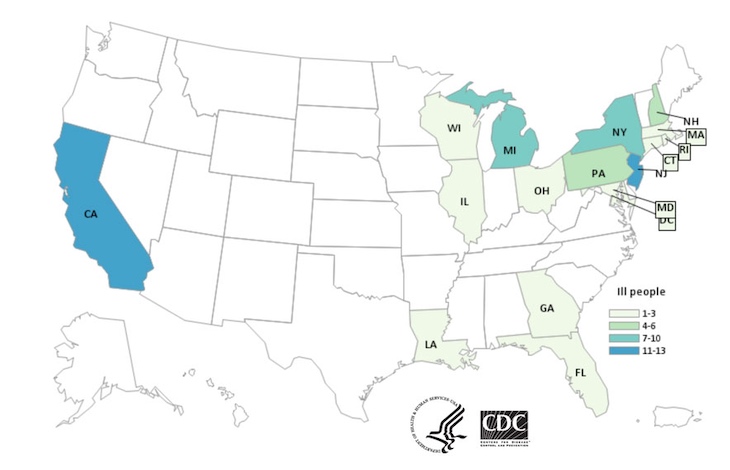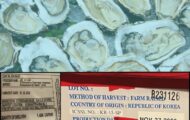The latest E. coli O157:H7 romaine lettuce outbreak has ended with 62 sick, according to the Centers for Disease Control and Prevention. Those people live in 16 states and the District of Columbia.

The case count by state is: California (12), Connecticut (1), Washington DC (1), Florida (1), Georgia (1), Illinois (2), Louisiana (1), Massachusetts (1), Maryland (1), Michigan (7), New Hampshire (6), New Jersey (13), New York (7), Ohio (1), Pennsylvania (5), Rhode Island (1), and Wisconsin (1). Illness onset dates ranged from October 7, 2018 to December 4, 2018. Twenty-five people were hospitalized because they were so sick. Two people developed hemolytic uremic syndrome (HUS), a type of kidney failure.
The FDA, CDC, and state partners investigated farms and cooling facilities in California that were identified during traceback. They found the outbreak strain of E. coli O157:H7 in sediment that was at the bottom of an agricultural water reservoir on an Adams Bros. Farming farm in Santa Barbara. The E. coli O157:H7 that was found in that reservoir was closely related genetically to the E. coli bacteria isolated from patients.

You can contact food safety attorney Fred Pritzker for help by calling 1-888-377-8900.
Adams Bros. Farming recalled cauliflower and red and green leaf lettuce on December 17, 2018. And Northwest Cuisine Creations and Fresh&Local sandwiches that were made with that lettuce were recalled on the same day. The FDA stated that “romaine lettuce form Adam Bros. Farming Inc. linked to this outbreak is no longer for sale,” since they stopped shipping on November 20, 2018.
There was not an overall recall of romaine lettuce when the outbreak was announced, but federal and state health officials told the public to avoid eating all romaine lettuce until they knew more about the origin. Then, officials narrowed the focus of their investigation to Monterey, San Benita, and Santa Barbara counties in California.
Some packers and processors started labeling romaine lettuce with the area it was grown and harvested. Officials told the public to avoid buying or eating any romaine lettuce that was not labeled. We don’t know if producers will continue to label the leafy green.
Most of those sickened said they ate romaine lettuce at home and in restaurants. Two illness clusters were found at restaurants, but those locations were not identified.




